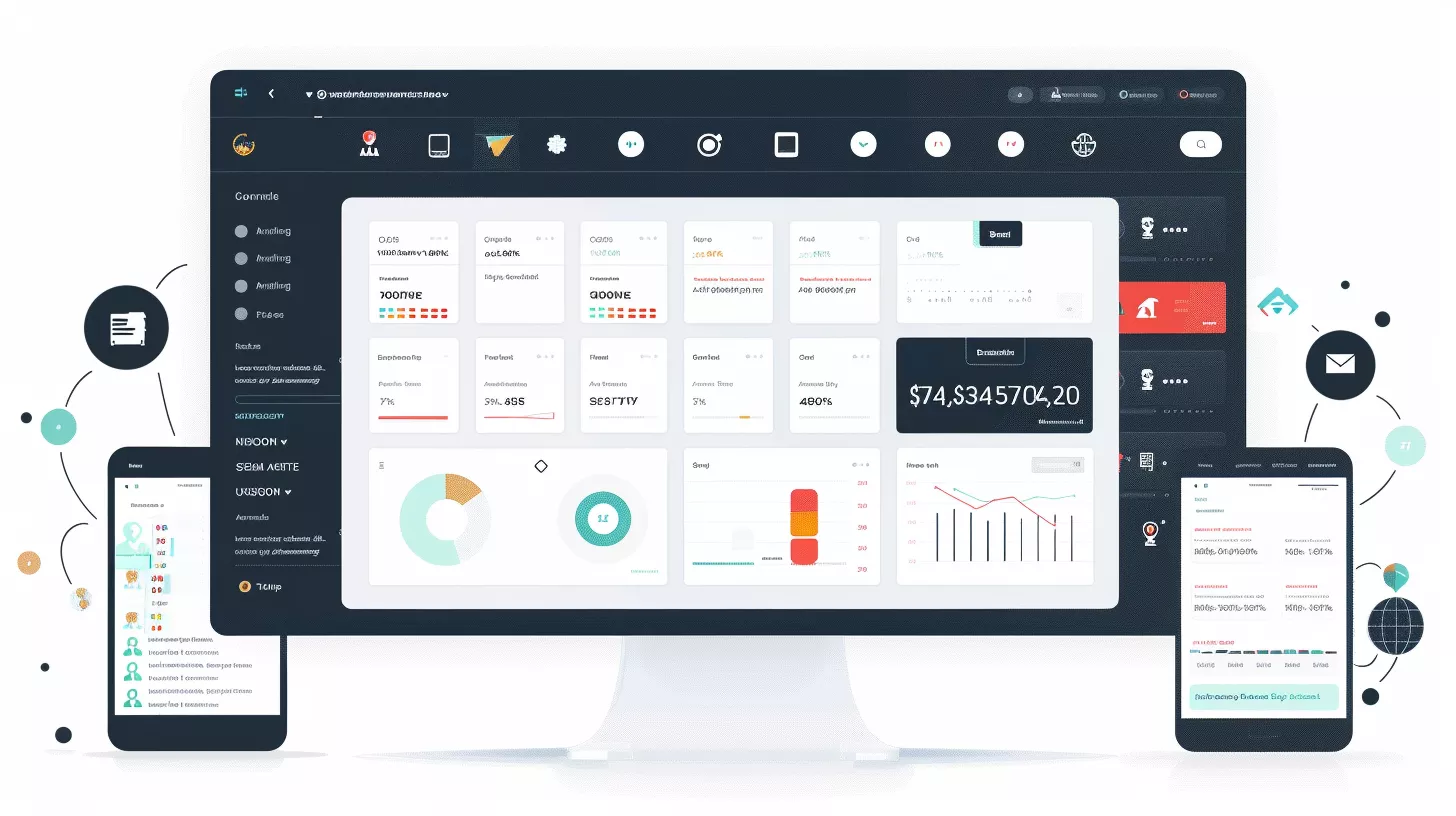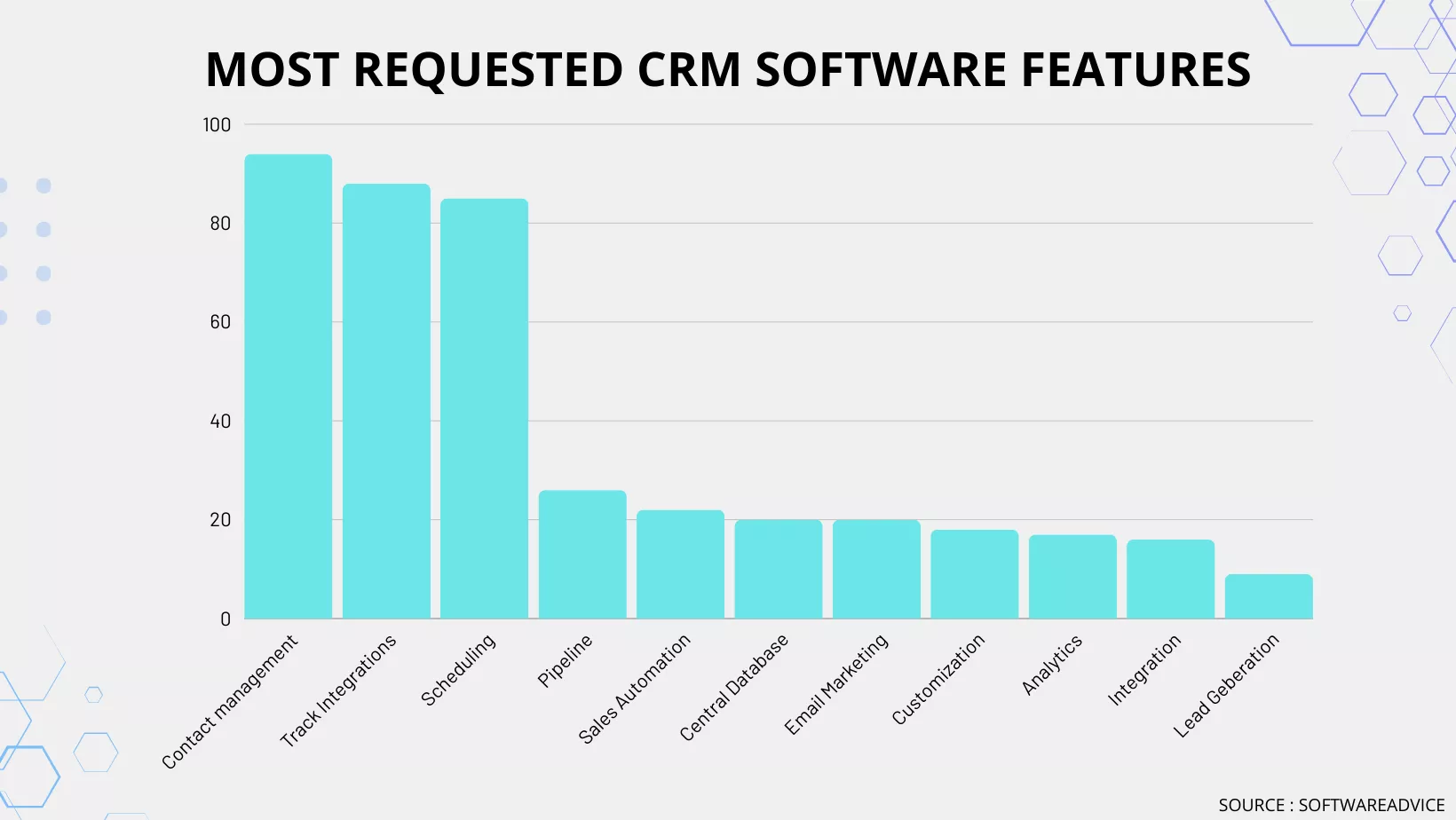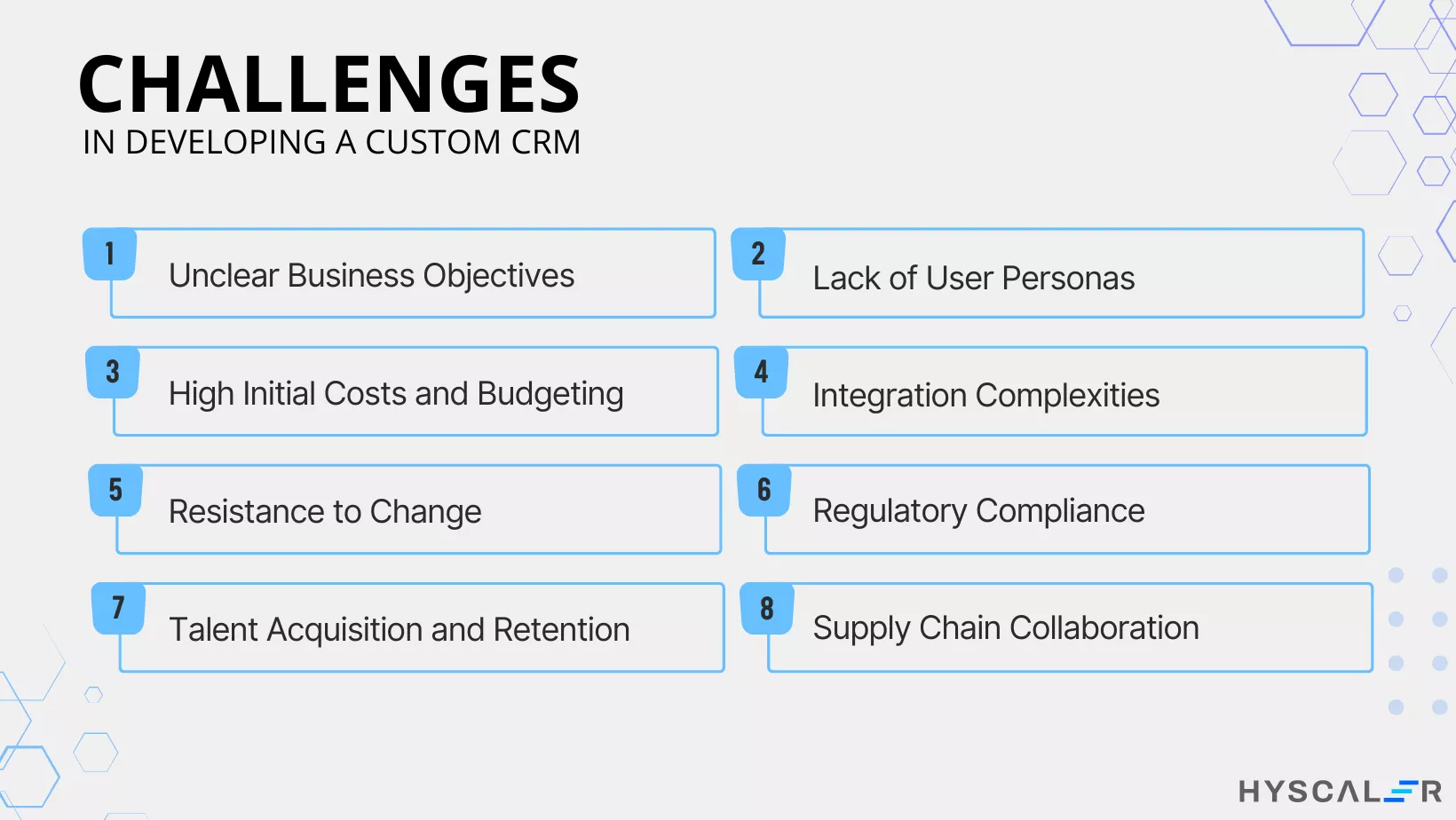Table of Contents
The global CRM (Customer Relationship Management) market size was estimated at $69.56 billion in 2023 and is predicted to reach $215.72 billion by 2032, growing at a CAGR of 13.4%. This rapid growth highlights the increasing importance of CRM systems for businesses of all sizes.
If you’re an owner of a medium or large business, you’ve likely already explored various CRM solutions such as dynamic business central. However, you may have reached a point where ready-made products can no longer fully meet your business needs, slowing your progress toward further growth and success. In such cases, building a custom CRM system can be the best solution.
According to research, 91% of companies with more than 11 employees use a CRM system, while just half of the companies with 10 employees or fewer don’t use it. CRM systems can also increase conversion rates by up to 300%, and 37% of companies agreed that they take full advantage of CRM systems.

Why Develop a Custom CRM?
While many businesses choose to build custom CRMs, it’s not always necessary. You can also opt for an off-the-shelf CRM solution to help manage customer relationships. Building a custom CRM platform requires significant time, money, patience, skill, and knowledge. Unless you have plenty of these resources to spare, it may not be advisable to take on the challenge of building a custom CRM for your business.
Instead, it would be wiser to evaluate pre-packaged software solutions to see which most closely matches your business needs. For smaller businesses or new ventures, exploring a CRM for start ups can provide an efficient and cost-effective solution to manage customer relationships without the complexities of custom development. This will save your company the expense of designing the software while still bringing you the most desirable benefits of using a CRM platform.
However, if you have an extremely specific list of requirements, investing in custom CRM software for the long term would be better. Custom CRM development allows you to tailor the system to your exact needs, ensuring seamless integration with your existing systems and processes.
Benefits of Building a Custom CRM
Tailored to Your Specific Needs
Imagine a CRM that’s built just for you. A custom CRM system is crafted to fit your unique business requirements, workflows, and processes. This means you’ll have a tool that works exactly how you need it to, boosting efficiency and effectiveness across your organization.
Seamless Integration
No more juggling multiple systems. Custom Customer Relationship Management Software can seamlessly integrate with your existing tools and systems. This integration ensures a smooth and efficient data flow, making it easier to manage your operations and maintain consistency across all your platforms. Additionally, integrating a Whatsapp CRM allows businesses to centralize real-time customer conversations, improve response speed, and enhance engagement directly within a channel customers already use daily.
Scalability and Flexibility
Growth is great, and your CRM should keep up with it. A custom CRM offers the scalability and flexibility to grow with your business. Whether you’re expanding your user base, adding new features, or handling more data, your CRM can adapt to meet your evolving needs.
Improved Data Security
Your customer data is precious, and a custom CRM gives you better control over it. Enhanced data security measures ensure that your information is safe and compliant with relevant regulations. This means you can trust that your data is protected and managed responsibly.
Enhanced Customer Insights
A custom CRM can be tailored to capture and analyze the specific data points that matter most to your business. This provides you with deeper insights into customer behavior and preferences, allowing for more personalized marketing and service strategies.
Streamlined Processes
With a custom CRM, you can automate repetitive tasks and streamline your business processes. This reduces manual work, minimizes errors, and frees up your team to focus on more strategic activities.
Increased User Adoption
Since a custom CRM is built with your specific needs in mind, it’s often easier for your team to use and adapt. This leads to higher engagement and more effective use of the CRM system, maximizing its value to your organization.
Competitive Advantage
A custom CRM can give you a competitive edge by enabling you to offer superior customer service and respond more quickly to market changes. By having a system that supports your unique strategies, you can stay ahead of your competitors.
Cost-Effective in the Long Run
While the initial investment in a custom CRM might be higher than off-the-shelf solutions, it can be more cost-effective in the long run. Custom solutions often result in lower ongoing costs because they fit your needs precisely and require fewer modifications over time.
Better Compliance Management
A custom CRM can be designed to help you meet industry-specific compliance requirements more easily. This ensures that your business stays compliant with all necessary regulations, reducing the risk of legal issues and fines.
By incorporating these advantages, a custom CRM becomes an invaluable tool for any business looking to optimize operations, enhance customer relationships, and maintain a competitive edge.
Customizable CRM Solutions (Customer Relationship Management)
Some companies are trapped in between ready-made CRM solutions that don’t have enough versatility and custom-built CRM platforms that take a long time to develop. What these companies need is a happy middle ground in the CRM market, where the available software is as easy to set up as its ready-made alternatives, but offers a level of flexibility closer to custom-built software.
This is where customizable CRM software comes in. Despite the similar sounding names, there is a clear difference between custom-built and customizable CRM software. While the former is built entirely from scratch, the latter allows users to add or remove modules and workflows to the pre-existing CRM platform’s structure according to their needs. With custom-built software, no two solutions are identical, but with customizable software, the base product remains the same, and only certain additional features and cosmetic elements change.
Suppose your company is looking for a level of customization in its CRM platform but doesn’t want to invest the time and money that goes into developing new software. In that case, customizable CRM solutions are your best bet.
How to Build a Custom CRM from Scratch
If you have the resources and appetite to build custom CRM software, you can address every single need you have, without spending money on extraneous features you never use. Let’s look at the step-by-step process of building a custom CRM system from scratch.
How to Build a Custom CRM: A Comprehensive Guide
Creating a custom CRM (Customer Relationship Management) system is essential for businesses looking to optimize their operations and enhance customer relations. This guide outlines the steps to build a CRM tailored to your specific needs, integrating insights from various experts.
1. Clarify Your Goals
The initial step in building a custom CRM is to clearly define your objectives. Determine what you aim to achieve with your CRM, such as improving customer interactions, streamlining sales processes, or enhancing data management. This clarity will guide you in identifying the essential features and functionalities needed in your CRM system.
2. Decide on CRM Features
Identifying the core features of your CRM is crucial. While features can vary based on business requirements, certain functionalities are standard across most CRM solutions:
- Contact Management: Organize and manage customer information, often utilizing contact management software to ensure data is structured and easily accessible.
- Interaction Tracking: Keep a record of customer interactions.
- Lead Management: Track and manage potential customers.
- Task Management: Create and manage tasks to ensure follow-ups.
- Task Automation: Automate repetitive tasks to save time.
- Analytics: Analyze data to make informed decisions.
- Integrations: Connect with other tools and systems for seamless data flow.
Modules and Their Features
As per the report, here are the top-requested and demanded CRM Software Features for various modules:

Sales Module:
- Dashboard: Provides an overview of sales activities.
- Opportunities and Pipeline View: Manage sales opportunities and visualize the sales pipeline.
- Lead and Task Features: Track leads and manage sales tasks through sales management software.
- Contacts Section: Maintain detailed records of customer contacts.
Marketing Module:
- Campaign Management: Plan and execute marketing campaigns.
- Social Media Integrations: Connect with social media platforms.
- Analytics: Track the performance of marketing efforts.
- Customizable Templates and Segmentation: Create personalized marketing messages.
Customer Support Module:
- Agent Dashboard: Monitor and manage support activities.
- Knowledge Base: Provide self-service options for customers.
- Case Reports: Track and resolve customer issues.
3. Find a Development Partner
Choosing the right development partner is critical. You have two primary options:
- In-House Development: Offers more control and a better understanding of business needs but requires a skilled team and higher costs.
- Outsourced Development: Provides access to a broader range of expertise and can be cost-effective but may involve less control and potential communication issues.
Evaluate potential partners based on their expertise, experience, and track record to ensure they can deliver a high-quality CRM solution. Working with a specialized CRM software development company can provide the expertise and resources needed to build a tailored solution that aligns perfectly with your business needs and goals.
4. Design the CRM User Interface and Experience
Designing a user-friendly interface is vital for the success of your CRM. Consider the following:
- Identify User Roles and Responsibilities: Understand who will use the CRM and their specific needs.
- Create User Personas: Develop personas to guide design decisions.
- Organize Data and Functionalities Logically: Ensure the system is easy to navigate.
- Group Related Features: Simplify navigation by grouping related features.
- Create a Design System: Maintain consistency across the CRM.
- Prioritize Frequently Accessed Data: Make essential information easily accessible.
- Customization Options: Allow users to tailor the CRM to their needs.
- Incorporate Onboarding Tools: Use contextual help, tooltips, and user guides to assist users.
5. Implement Robust Testing and Quality Assurance
Before launching your CRM, it’s crucial to conduct thorough testing. Identify and fix any bugs, performance issues, or usability problems. Ensure the system complies with relevant regulations and security standards.
6. Launch the CRM and Provide Ongoing Support
Develop a comprehensive deployment plan that includes user training and rollback procedures. Be prepared to offer post-launch support to address any issues, bugs, and user concerns. Continuous support and updates are essential to maintain the system’s effectiveness and user satisfaction.
Building a custom CRM tailored to your business needs can significantly enhance your operations and customer interactions. By clarifying your goals, selecting the right features, partnering with the right development team, designing an intuitive interface, and ensuring robust testing and support, you can create a CRM that drives efficiency and growth.
Challenges in Developing a Custom CRM
Developing a custom CRM system tailored to your business can offer significant advantages, but it comes with its own set of challenges. Here are some common obstacles you might face:

Unclear Business Objectives
A primary challenge is having undefined or vague business objectives. Without a clear understanding of what you aim to achieve with your CRM, it can be difficult to determine the necessary features and functionalities. This misalignment can result in a system that doesn’t meet your business needs, leading to wasted resources and poor user adoption.
Lack of User Personas
Creating detailed user personas is crucial for designing a CRM that meets the diverse needs of your organization. Inaccurate or non-specific user personas can lead to a system that is difficult to use and doesn’t deliver the expected benefits, resulting in a poor user experience and low adoption rates.
High Initial Costs and Budgeting
The upfront investment required for developing a custom CRM can be a significant barrier, particularly for small and medium-sized businesses. It is essential to have detailed budgeting and a clear understanding of the anticipated return on investment (ROI), considering development, implementation, training, and ongoing maintenance costs.
Integration Complexities
Integrating the new CRM with your existing systems and tools can be complex. This process requires careful planning and thorough testing to ensure smooth data migration, compatibility, and streamlined workflows. Poor integration can lead to data silos and inefficiencies, diminishing the benefits of the CRM.
Resistance to Change
Resistance to change is a common issue when implementing a new CRM system. Employees may be reluctant to adopt new technology, fearing disruptions to their established workflows. Effective change management strategies, including comprehensive user training and support, are essential to facilitate a smooth transition.
Technological and Data Management Challenges
Integrating various technologies and managing large volumes of data can be daunting. Ensuring that your CRM can handle data from multiple sources and provide actionable insights requires robust data management practices and advanced technological integration.
Regulatory Compliance and Governance
Adhering to regulatory requirements and ensuring data governance can be challenging. Your CRM system must comply with relevant laws and regulations, such as GDPR, necessitating careful planning and implementation of stringent data security measures.
Supply Chain Collaboration and Communication
Effective collaboration and communication across the supply chain are vital for the success of a CRM system. Ensuring all stakeholders are aligned and can effectively use the CRM for their needs can be a significant challenge.
Talent Acquisition and Retention
Finding and retaining skilled professionals to develop, implement, and maintain your CRM can be difficult. The demand for tech talent is high, and ensuring you have the right team in place is critical for the success of your CRM project.
By recognizing and addressing these challenges, businesses can better prepare for the complexities involved in developing a custom CRM and increase their chances of success.
Cost Considerations for Building a Custom CRM
The cost to build a custom CRM can vary significantly depending on several factors, including:
Factors Influencing the Cost
- Number of features and modules
- Size of the development team
- Expertise level of the development team
- Additional expenses (project management, QA, etc.)
Estimating the Total Cost of CRM Development
- Developing an MVP to get a more accurate cost estimate
- Considering long-term maintenance and support costs
It’s important to carefully evaluate the expected return on investment (ROI) and weigh it against the upfront and ongoing costs of custom CRM development. This will help you decide whether building a custom CRM is the right choice for your business.
HyScaler’s Expertise
Building a custom CRM can be a transformative step for your business, providing a tailored solution that addresses your unique needs and helps you achieve your goals. By carefully planning the development process, choosing the right development partner, and addressing potential challenges, you can create a CRM system that drives customer engagement, improves operational efficiency, and supports your long-term growth.
Whether you choose a ready-made, customizable, or fully custom-built CRM solution, the key is to align your CRM strategy with your business objectives and ensure that the system seamlessly integrates with your existing workflows and tools. With the right approach, your custom CRM can become a powerful asset that fuels your company’s success.